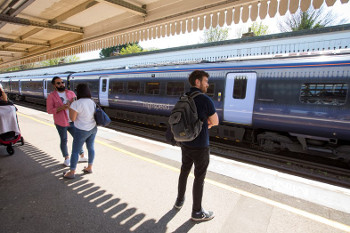Chris Ames asks what passengers on the South Eastern rail franchise are getting in return for the scrapping of the search for a new operator, which had promised significant improvements.
This week it was announced that London Overground passengers will get a month’s free travel by way of compensation for disruption. At the same time, ministers announced that they were cancelling the competition to re-let the South Eastern rail franchise, leaving existing operator Govia operating it under its 'Southeastern' brand until at least next April.
In 2017, launching a consultation on plans for the new franchise, the then transport secretary, Chris Grayling said: ‘Passengers on a new South Eastern franchise from 2018 will enjoy modern trains with more space and a more punctual and reliable service.’

Southeastern passengers are waiting for improvements - and trains
Mr Grayling also floated the idea of scrapping first class to make more room for commuters.
The old franchise was due to expire in June 2018, having been set up as a direct award to incumbent Govia in 2014. To cut a long story short, there have been a series of extensions, leading to Mr Grayling announcing in April that the franchise would continue to operate under Southeastern until November, with an option to extend to April 2020.
When the further extension was confirmed on Wednesday, David Sidebottom, director of watchdog Transport Focus, said: ‘Southeastern passengers will be disappointed to hear that the promise of improvements to their journeys has been put back again.’
We asked Southeastern what passengers were getting in return for the contract extensions and the consequent delay to the promised improvements.
A spokesperson explained that until April’s announcement, previous extensions had been within the scope of the 2014 direct award contract, which had made a number of stipulations about service improvements.
He was keen to stress that Southeastern has continued to bring in improvements, including Wi-Fi on trains, further station enhancements and the extension of 'smart ticketing'.
As far as the new contract is concerned, the spokesperson highlighted the introduction of Delay Repay 15, this autumn, under which passengers can claim compensation for delays of 15 minutes, and improvements to the firm’s delay repay website.
The spokesperson was not sure whether this was being funded upfront by the Government or Southeastern, which is not surprising. As Transport Network has reported, the Department for Transport (DfT) has funded the extension of Delay Repay 15 to existing franchises but made it a condition of new ones.
The latest extension technically comes within the latter category, so it will have effectively been priced into (i.e. deducted from) Southeastern’s premium payments to the DfT. In short, the Government is standing the tab.
There is also the promise that Southeastern's the Key 'smartcard' will be able to carry old-style single and return tickets purchased online 'for the first time' and a new ‘Best Fare Finder’.
On Thursday Southeastern's managing director, David Statham, said: ‘We’re proud to have delivered more than £80m of improvements for passengers since we began a new Direct Award contract in 2014.
‘Punctuality has improved by nearly 10% in two years, we’ve introduced free WiFi on our trains and boosted capacity on board with 5,000 extra seats.’
Regarding the punctuality issue, a Southeastern spokesperson said it reflected the industry’s new preferred measure, which measures trains that are actually on time as well as various degrees of lateness, including the five minutes late that counts as a punctuality fail for a commuter train under what remains the industry’s official measure – the public performance measure (PPM).
You can see why the industry would want to use the new measure, as opposed to the PPM, which counts trains that are either cancelled or miss stops to make up time as automatic failures. The new industry measure only counts trains that arrive, with a complex way of accounting for trains that miss stops.
As a result, Southeastern’s most recent statistics show 95.5% of trains arriving within five minutes of scheduled arrival time.
On the other hand, Southeastern’s PPM average for the year 2018/19, as reported by regulator the Office of Rail and Road, was 88.4%, having fallen from 88.7% in 2017/18, which was up from 86.1% in 2016/17.
That doesn’t look like a 10% improvement from where I’m sitting...waiting.
Register now for full access
Register just once to get unrestricted, real-time coverage of the issues and challenges facing UK transport and highways engineers.
Full website content includes the latest news, exclusive commentary from leading industry figures and detailed topical analysis of the highways, transportation, environment and place-shaping sectors.
Use the link below to register your details for full, free access.
Already a registered? Login